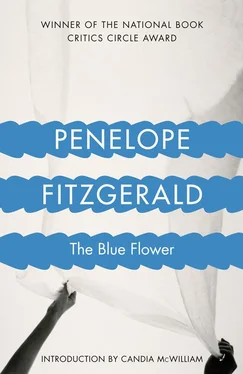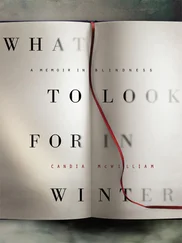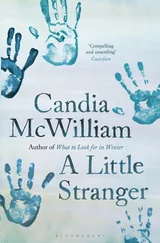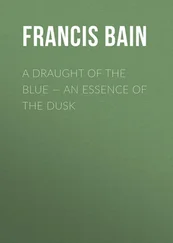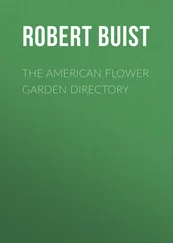The Blue Flower
Penelope Fitzgerald

From the reviews of The Blue Flower:
‘A minor miracle of sympathy and crispness’
Adam Mars-Jones, Guardian
‘An extraordinary imagining … an original masterpiece’
Hermione Lee, Financial Times
‘ The Blue Flower is an utterly gripping and involving novel which lingers long in the mind. I know of no contemporary writer who more exactly fulfils the brief which Lord Grey of Fallodon drafted apropos of Jane Austen (‘‘With all these limitations you are to write, not only one novel, but several, which … shall be classed among the first rank of the novels written in your language in your country’’).
‘So how does she do it? Is it the style? To an extent, yes, but not in any obvious way. The prose is rapid, plain and unassuming, with a fondness for dry wit and familiar allocutions. There is little imagery and no recondite vocabulary. Obliquity, timing, and the virtues of omission and allusion are her secrets. Paragraphing bears no obvious relation to temporal or spatial co-ordinates. We flit from one point of time, one view and place, with the nonchalance of a ministering yet invisible spirit.
‘These are, in a sense, negative virtues, and this may be the key to the mystery. How many historical novelists seem to view the past like someone scanning a brochure of Tuscan villasina grey November, asa foreign country where they do things not just differently but more interestingly? And when real historical figures with a known fate and stature are involved, how hard not to fall into the fallacy of assuming that they and their contemporaries were either aware of or wholly unconcerned about the figures they would cut for us, backlit by the retrospective glow which posterity has bestowed on them. Penelope Fitzgerald does not just step safely through this minefield, she makes of it a dance arena in which not only the central characters but all their numerous siblings, relatives and friends come to tumultuous and convincing life. Her past is as present, this being as ‘‘unbearably light’’, its search for meaning as urgent and provisional, as our own.’
Michael Dibdin, Independent on Sunday
‘There are twenty perfectly competent novelists at work in Britain today, but only a handful producing what one could plausibly call works of literature. Of this handful, Penelope Fitzgerald possesses what one can only call the purest imagination. Her limpid, exact prose reflects an unwaveringly clear view of the human predicament. She seems to be one of those rare artists gifted with both the knowledge of how things are, and the skill to record what she knows with subtlety and devastating truthfulness.’
A.N. Wilson, Evening Standard
‘The tension between Fitzgerald’s cool and the alien turbulence of most of her characters adds piquancy … each one, however briefly he or she appears, is as visible and audible as the twigs scraping the windows. Fitzgerald tells you what they eat (goose, eel, cabbage, plums), what they read (if they read), and what they think about the French Revolution. It is fastidious, funny, sad, clever and very engaging.’
Gabriele Annan, TLS
‘She is an intelligent writer, superbly and unfailingly so. But her dry wit is also allied to a great talent for emotional sympathy. The disappointment of Karoline Just … is as terrible and as penetratingly understood as the humiliation of Chekhov’s Varya rummaging for galoshes while the cherry orchard changes hands. A wise and funny novel.’
Lucy Hughes-Hallett, Sunday Times
‘The life of Fritz von Hardenberg, the German romantic poet Novalis, might not seem a likely subject for Fitzgerald’s ironic gift. In fact, the cool examination of the poet’s grotesque family, all the minute historical details which are never laboured and always convincing, and the unsentimental, moving account of Fritz’s slightly absurd passions are all very beautifully done. Fitzgerald never seemsto try too hard; she never bullies the reader, but her dry, small-scale prose manages to produce large-scale emotional effects.’
Philip Hensher, Mail on Sunday
‘ The Blue Flower is a model of what historical fiction can be at its best – when the radical otherness of other times is not merely acknowledged but made integral to the fictional experience. It's also Fitzgerald at her best – elegant, inventive, hilarious, unsparing. I adore this book.’
Jonathan Franzen
Contents
COVER
TITLE PAGE
PRAISE
PREFACE BY HERMIONE LEE, ADVISORY EDITOR
INTRODUCTION
EPIGRAPH
1. WASHDAY
2. THE STUDY
3. THE BERNHARD
4. BERNHARD’S RED CAP
5. THE HISTORY OF FREIHERR HEINRICH VON HARDENBERG
6. UNCLE WILHELM
7. THE FREIHERR AND THE FRENCH REVOLUTION
8. IN JENA
9. AN INCIDENT IN STUDENT LIFE
10. A QUESTION OF MONEY
11. A DISAGREEMENT
12. THE SENSE OF IMMORTALITY
13. THE JUST FAMILY
14. FRITZ AT TENNSTEDT
15. JUSTEN
16. THE JENA CIRCLE
17. WHAT IS THE MEANING?
18. THE ROCKENTHIENS
19. A QUARTER OF AN HOUR
20. THE NATURE OF DESIRE
21. SNOW
22. NOW LET ME GET TO KNOW HER
23. I CAN’T COMPREHEND HER
24. THE BROTHERS
25. CHRISTMAS AT WEISSENFELS
26. THE MANDELSLOH
27. ERASMUS CALLS ON KAROLINE JUST
28. FROM SOPHIE’S DIARY, 1795
29. A SECOND READING
30. SOPHIE’S LIKENESS
31. I COULD NOT PAINT HER
32. THE WAY LEADS INWARDS
33. AT JENA
34. THE GARDEN-HOUSE
35. SOPHIE IS COLD THROUGH AND THROUGH
36. DR HOFRAT EBHARD
37. WHAT IS PAIN?
38. KAROLINE AT GRüNINGEN
39. THE QUARREL
40. HOW TO RUN A SALT MINE
41. SOPHIE AT FOURTEEN
42. THE FREIFRAU IN THE GARDEN
43. THE ENGAGEMENT PARTY
44. THE INTENDED
45. SHE MUST GO TO JENA
46. VISITORS
47. HOW PROFESSOR STARK MANAGED
48. TO SCHLÖBEN
49. AT THE ROSE
50. A DREAM
51. AUTUMN 1796
52. ERASMUS IS OF SERVICE
53. A VISIT TO MAGISTER KEGEL
54. ALGEBRA, LIKE LAUDANUM, DEADENS PAIN
55. MAGISTER KEGEL’S LESSON
AFTERWORD
AUTHOR’S NOTE
BY THE SAME AUTHOR
COPYRIGHT
ABOUT THE PUBLISHER
Penelope Fitzgerald
Preface by Hermione Lee, Advisory Editor
When Penelope Fitzgerald unexpectedly won the Booker Prize with Offshore , in 1979, at the age of sixty-three, she said to her friends: ‘I knew I was an outsider.’ The people she wrote about in her novels and biographies were outsiders, too: misfits, romantic artists, hopeful failures, misunderstood lovers, orphans and oddities. She was drawn to unsettled characters who lived on the edges. She wrote about the vulnerable and the unprivileged, children, women trying to cope on their own, gentle, muddled, unsuccessful men. Her view of the world was that it divided into ‘exterminators’ and ‘exterminatees’. She would say: ‘I am drawn to people who seem to have been born defeated or even profoundly lost.’ She was a humorous writer with a tragic sense of life.
Outsiders in literature were close to her heart, too. She was fond of underrated, idiosyncratic writers with distinctive voices, like the novelist J. L. Carr, or Harold Monro of the Poetry Bookshop, or the remarkable and tragic poet Charlotte Mew. The publisher Virago’s enterprise of bringing neglected women writers back to life appealed to her, and under their imprint she championed the nineteenth-century novelist Margaret Oliphant. She enjoyed eccentrics like Stevie Smith. She liked writers, and people, who stood at an odd angle to the world. The child of an unusual, literary, middle-class English family, she inherited the Evangelical principles of her bishop grandfathers and the qualities of her Knox father and uncles: integrity, austerity, understatement, brilliance and a laconic, wry sense of humour.
Читать дальше
